#walt disney defense
Explore tagged Tumblr posts
Text
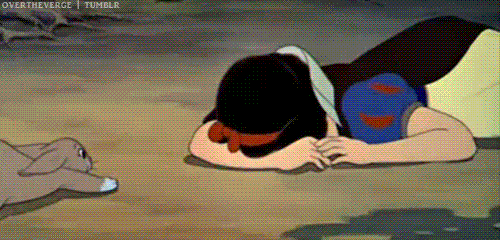
I love the comments and defense of the original Snow White but some people are not taking the defensive position that I would take, all things considered.
I mean, asking the question “since when is it bad to wish for love?” is one thing, but then sometimes people follow it up with, “and that’s not all she wanted! That’s not her main goal!”
Okay I appreciate you but yes it was. Let’s just call it like it is. And then don’t back down. Hear me out.
The first thing you learn about Snow-White is from that pretty opening-fairy-tale-book page, where it points out two characters: the wicked and vain stepmother who is afraid of Snow White and dresses her in rags to cover up her beauty, and uses her as a scullery maid—and Snow White herself, who is…well, used as a scullery maid.

Treated as a servant, and actively hated by the only family she has. And she’s a child. She hasn’t been alive very long to experience anything other than hatred and jealousy toward herself.
She’s even talking to birds, and the fact that they’re clustered around her from beginning to end of that opening scene indicates that they’re very comfortable with her and she talks to them all the time—because they’re the only positive interaction she gets to have.
That’s the situation that Snow White is in. But the first thing you learn about who she is and what she wants comes when she wishes in the well. And what’s she wishing for?

Love. The one she loves. A specific, male figure, who will say nice things to her and find her. She wants him to come quick. Why?
How silly. How vapid and shallow of her. How weak and one-dimensional. Please, goodness, can’t someone update her to have some depth?

NO. She is a young woman who is not given any love and is treated like a horrible nuisance who must be covered up in dirt and rags. She has no friends except birds, who can’t talk back. She is actively hated by the closest person to her.
It’s a miracle she even knows the word “love” and has the strength of character to believe in it after the situation she’s grown up in.
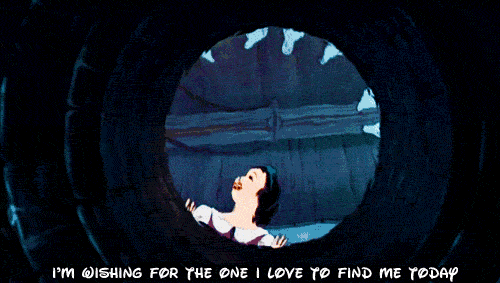
The song very specifically says “I’m wishing…for the one I love…to find me…today. I’m hoping…and I’m dreaming of…the nice things…he’ll say.”
She wants to be loved because she isn’t loved. Geez, she wants someone to say nice things to her. She wants to give her own love because she doesn’t have anything but courtyard doves to befriend. Of course it’s her goal. Of course it’s her wish. What wish or goal could be higher? And what wish or goal could be more natural for a character in her situation?
And even more than that, what could be stronger than believing that it will happen? This character who’s been unloved and mistreated by everyone takes a Prince at his word when he says he’ll give her that love. He promises it, and she believes him.
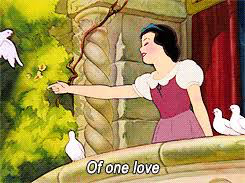

She has every opportunity and right to be bitter, hardened, anti-social, self-absorbed (pre-Huntsman and Dwarfs, she could very easily believe that nobody else is going to watch out for her except herself) and jaded. But instead she has this pure faith, which it takes a lot to maintain when everything has been ripped away from you. She could’ve been totally swamped by doubt and bitterness.

I mean, she could worry that the Prince won’t be able to convince her Stepmother to let him marry her.
Then when she gets chased into the woods for her life, she could fret that the Prince wouldn’t know how to find her.
Heck, she could just forget about him, give up, and say, “this is my life now, I’m living with these seven dwarfs and we’ll take care of each other, I guess that’s the most I can hope for.”
But no. She has faith in his promise, and hangs on to her dream, and sings, with total assurance, “Someday My Prince Will Come.” I mean, she won’t even let a moment of panic in the woods go by without reprimanding herself for losing that faith, for a second.
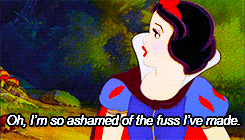
Can any of you say the same? Can any of you imagine being that kind of person: the kind of person who unashamedly wants to love and be loved in return, and when everything is stripped away and every chance at that taken from you, you hang on and believe anyway? You stay positive and even joyful anyway? For love?
Come on. Defend that. Yes, her goal was “just” to be loved. And to love in return. The fear of having her life taken from her, the necessity (not the desire for) freedoms from that, was just an obstacle in the way of being loved. And this isn’t a movie about Snow White’s natural reaction to abuse. It’s about her strength of faith in love in SPITE of that abuse. The spotlight is on her strength, not her weakness, but it’s strength of faith in love.
Anyway.
If you believe that it’s good and fine for a girl’s whole goal and fondest dream is to be loved, then don’t stand with one foot in that camp and another in the camp that says “girls want more than just love.” No, what? Love is the best thing a girl can want. I’m not talking about “romance.” I’m not talking about sex. I’m talking about pure, self-sacrificial, kind love. It’s the best thing they can want, and Snow White is one of the only characters who does want it unashamedly, uncomplicated.

Just defend that. Don’t try to argue that the “Someday My Prince Will Come” Princess isn’t wholeheartedly after love. Makes it look like you don’t believe that’s as wonderful as it is.
#Snow White#Snow White 1937#Snow White 2024#Snow White and the seven dwarfs#Snow White and the seven dwarfs 1937#Walt Disney#classics#love#discourse#meta#analysis#Disney analysis#Snow White defense#Rachel Zegler#gal gator#greta gerwig#Disney appreciation#snow wh appreciation#Snow White hate#true love#self-sacrificial love
1K notes
·
View notes
Text
Kat on her father’s disappearance:
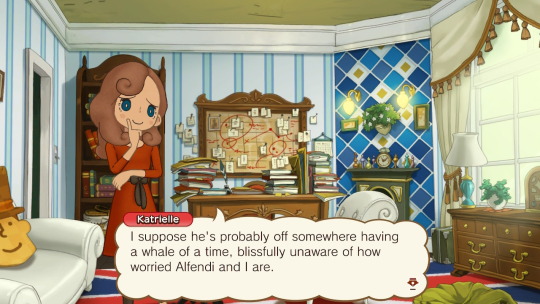
The whale of a time:
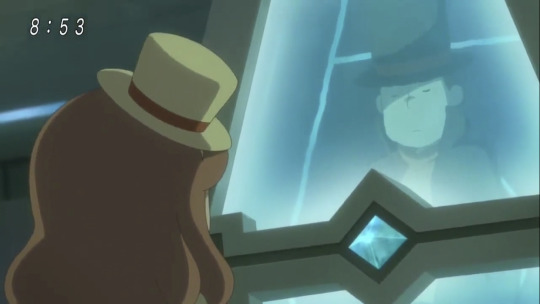
#professor Layton#layton’s mystery journey#layton mystery tanteisha#lmt spoilers#lmj spoilers#Katrielle Layton#Hershel Layton#in the game she’s like ‘eh he’s fine#I’m sure he’s got this#because he’s always got this’#in the anime#darling hes basically been on ice for ten years#Walt Disney’s frozen head under the Matterhorn style#what’s a shittier whale#this one or that movie that got nominated for all the Oscar’s#queue takumi defense squad
39 notes
·
View notes
Text

I despises that Israel Defense Forces (IDF) and Israel Police.
#toy story#toy story 2#rex#hamm#i despises that idf#i despises that israel police#i despise that chicken#free palestine#free gaza#free rafah#save palestine#israeli riots#idf terrorists#israel defense forces#idf#israel police#israeli revolution#benjamin netanyahu#anti netanyahu#bibi netanyahu#netanyahu is villain#itamar ben gvir#anti ben gvir#police brutality#disney#walt disney#pixar#disney pixar#memes#meme
1 note
·
View note
Text
I have to have a chuckle at the Screenrant article posted recently about the Galactic Starcruiser, which totally wasn't about Jenny Nicholson's video honest.
In part, because early in Nicholson's video, she talks about how unnatural it is to have your influencers speak in adcopy and copyright rather than the more colloquial nicknames, and how it makes the people speaking about the product seem very insincere and, well, paid off. Because normal humans don't speak that way, but advertising does.
What's the first two lines in this article?
"As a life-long fan of Star Wars, there was nothing quite as exciting as finding out that I would be working on the immersive Star Wars: Galactic Starcruiser experience. Located at the Walt Disney World Resort, the Galactic Starcruiser opened on March 1, 2022, and welcomed passengers to board a two-day, two-night cruise through the stars, during which they could live out their own Star Wars adventure."
No one talks like this naturally. No one writes like this naturally.
This is supposed to be your passioned defense of the place you worked at, the people you worked with, and the memories you made along the way. C'mon! Why don't you open with a story, perhaps an anecdote about the best moment you had working there, or the devastation of the day you lost your dream job. We need to feel your humanity! But there's nothing of that here, to the point where you can just hear the TM behind Galactic Starcruiser.
The first half of this article continues in this vein, reading like a press release Disney marketing put out, just with past tense rather than present or future tense:
"Essentially, the Starcruiser experience was a 48-hour movie that passengers were actually a part of. It was all facilitated through the "datapad," which was accessed through the Play Disney Parks app."
"To facilitate the overarching immersive experience and storytelling, the Starcruiser built a jam-packed itinerary for each and every guest that would consist of a variety of important activities: the captain's toast at muster, a bridge training exercise, lightsaber training, and more. These types of events were essential to understanding what was happening, as they would give passengers the chance to interact with characters and build their story. This is why the Starcruiser could never be just a hotel; every part of it was designed for enthusiastic interaction."
Like, c'mon. I used to work in television. I've seen and used adcopy in my former job, and this is some serious adcopy. It honestly wouldn't shock me if the author dredged up some old adcopy they had lying around about the topic and just transferred it over, changing the tense. You're not here to sell us this product, because there is no product to sell. It's gone, it's been gone for a year, you don't have to sell us on IT. Speak about your experiences.
The next part is yet another topic that Jenny Nicholson pointed out, the bad faith excuses that influencers and advertisers made for the extreme price point:
"What many people don't know, however, is that the price included much more than just a room. The passengers' food, park tickets, recreation activities on board, non-alcoholic drinks, and more were all included - with merchandise being one of the few additional costs on board."
Which is absolute bad faith reasoning, especially when there are plenty of other vacation options that are ALSO all-inclusive, but are MUCH cheaper and offer MORE amenities than the Galactic Starcruiser did! Including Disney Cruises, owned by the same company! Seriously, you can go on a halfway decent sounding cruise or all-inclusive resort somewhere warm for, like, a week or two and spend far less than GSC cost.
Then the last part is essentially: "All the workers liked working there and the bad reviews afterwards make the workers who worked on it feel sad. :("
Which, like, companies have been hiding behind that reasoning for ages. Curiously, the author never offers....any reasons or stories. WHY did working on it impact you so much? What set it apart, what were the people like, what did you like about working there, why are you so passionate about it even a year later? There's nothing, just a generic sort of "We worked hard." and "We're sad it's gone." Why? How? What happened? The video you're obviously writing this in response to is filled with personal anecdotes and stories, it's the backbone of the video! Again, you need to give us something to show your humanity!
Especially when you consider that Nicholson repeatedly points out that the only highlight about her experience, the only thing that kept the damn thing going was the workers.
She had nothing but praise for them, and nothing but contempt for the higher ups who wasted and abused that enthusiasm, to the point where one of her last points was "Hey, Disney is basically exploiting labor."
Much like Jenny, I'm also not condemning anyone who had a good time working there. Good! If you were having a good time at work, that's great. If you have good memories about the people, awesome. But I'll note two things:
a) That doesn't meant you weren't being exploited, and
b) That doesn't mean you have to be a useful idiot for the corporation you worked for afterwards.
I'm not conspiracy brained enough to go "Oh, Disney TOTALLY forced this article into being.", because a cursory examination of the author's prior works and such suggests a lifelong passion for Star Wars, she did work at the hotel, and she's a Star Wars Editor (whatever THAT means in this day and age) for Screen Rant. Apparently one of the heads of Screen Rant says that Disney had no hand in it either.
Though, I can see why people would think that way. It READS like a press release, not something a normal human being would write about an experience they feel passionate about.
#jenny nicholson#star wars#galactic starcruiser#disney#screen rant#star wars hotel#disney world#you can't defend with adcopy#you just sound super fake
2K notes
·
View notes
Text
there's something about the Walt Disney in Saving Mr. Banks saying "Because that's what we storytellers do. We restore order with imagination. We instill hope again and again and again."
just like there's something about the critic in Ratattouille saying "...the average piece of junk is probably more meaningful than our criticism designating it so. But there are times when a critic truly risks something, and that is in the discovery and defense of the new. The world is often unkind to new talent, new creations. The new needs friends."
and the way Neil Gaiman said "The best thing about writing fiction is that moment where the story catches fire and comes to life on the page, and suddenly it all makes sense and you know what it’s about and why you’re doing it and what these people are saying and doing, and you get to feel like both the creator and the audience. Everything is suddenly both obvious and surprising… and it’s magic and wonderful and strange."
with posts writen by users like @hallwriteblr saying "to you, it’s a shitty sentence. to some random bitch 500 miles away, it’s a fire line that’ll haunt them for the next 17 years. you don’t know how impactful your writing is because it’s been in your brain for far too long now. you’ve stared at it for hours and repeated “this sucks” over and over again to the point that you killed your capacity to feel anything about your work. but trust me, once you get your shit out there, someone’s gonna go over that paragraph you hate and go “jesus fucking christ” and put the book down to have an existential crisis."
and how @pascalcampion wrote a comic that said "People don't always remember the details of what you do. They remember how it impacted them. How they felt. How what you did made them feel. That feeling will stay with them longer than the memory of the act itself."
that makes me want to write
and think its worth it
#everafterrambles#original#my writing#sort of#idk I watched saving Mr banks and now i'm having some feelings#that make me think i'm glad I became what I am#even if it makes my life harder
360 notes
·
View notes
Text

ID: a reply by user @riocinn reading quote "I would love to hear your take on how walt disney's views affected bambi 1!" endquote. End ID.
So, before replying to this and talking out of my ass like I was in the original post, I decided to do a little research to learn more about the context surrounding Bambi's production. I made this a fucking essay, and I'm sorry lol. Also, whilst I did watch around 4 hours of backstage content, I did not reread the book, which I haven't picked up since 2018, so if any of my notes on the book seem off, I apologize.
Word count: like, 2k, I'm sorry
My key points in Walt's influence on his adaptation of Bambi:
Glorifying the military (stay with me)
The ongoing war making entertainment a field for escapism instead of drama
American culture of individualism, legacy, and toxic masculinity (stay with me)
Romanticizing nature (in a bad way)
Walt was just a really privileged guy who didn't have his own "oppressive party" to allegorize in his telling of Bambi like Salten did.
In the tags of my original post, I basically said that Disney classic animal movies (like Bambi and Dumbo) either have some sort of subconscious bias yuck to them or the movie is empty enough that my mind wanders to Walt's problematic bs. And yeah, after researching, I think I still stand by that lol
Points 1 and 2: Military influence
In the backstage Disney featurette "1942: The Year of Bambi," the narrator paints a generalized but pretty good picture of American culture at that time. Because of the war going on, Disney halted production on all commercial works except for Bambi--but most of the studio output was in military-related classic Mickey shorts. Due to the war and the Great Depression going on, entertainment in 1942 aimed to offer "escapism, inspiration, and romance." Which definitely explains why Bambi was watered down from it's cruel tonality, and why it was marketed and created as a romance movie, even though the original book was very much Not That.
In the original trailer for Bambi, the theme of "love" is actually equated with courage, sacrifice, heroism, and fearlessness, instead of just being romance or affection, and I feel like this was also the military influence on the movie. (Courage? Bravery? Sacrifice? Sounds like something Walt would say about the military in 1942.)
Point 3: Individualism, characterization, and Legacy
I do not have any kind of source for this part. Walt Disney never mentions anything about legacy, individualism, or the characterization of the protags in any of his creative notes or interviews. However, these are well known aspects of American culture that I can imagine influencing the movie. I suggest their influence was entirely subconscious, if there was any actual influence to begin with.
I feel like the Great Prince's characterization in the movie had a distinctly idealized masculinity to him. He was stoic, noble, courageous, wise, everybody respected him, and he has descendants (of boys!) to carry on his legacy. These were all kind of idealized characteristics for men to have in America in the 30s and 40s. Bambi 2 gives him a deeper and much more human quality--turning him into a real character instead of an aspirational type.
By contrast, the women are all kind of nothingy. Faline is JUST the love interest, and all of the released concept art of her shows her as an adult. In the creative meetings, Walt and his team lament that Bambi's mother was so hard to animate because there was nothing to her, so she was always directed to be talking TO someone so the animators had some form of characterization to work with. (Who's fault is that Walt. Whose fault is that.)
The book had a dynamic among all of its characters that was basically impossible to adapt onto the screen with all the changes they made (namely reducing the dialogue to only about a thousand words and story/thematic changes). Faline was the love interest, but then she was upset when Bambi eventually left her to follow the Old Stag, who was infinitely more interesting to him. The Old Stag isn't Bambi's father, but comes to call him a son in a moment of character development where he lets his self-imposed isolation slip. Idk, there's just so much I could say about it, but I think you get the point.
Point 4: The romanticization of nature and shifting of allegorical messaging
Salten's original novel is a naturalist animal xenofiction novel, which means it aims to portray a realistic look into the life of a young deer with minimal anthropomorphism or mysticism. A lot of people who know Bambi from the movie laud the book as being "dark" and "callous," but a lot of NAX enjoyers know that this is kind of par for the course within the genre. There is no morality to attribute to Bambi having a deadbeat dad because ALL deer in real life have deadbeat dads. That's just how nature is, and Salten never seemed to lament or condemn this in his book (because he wasn't anthropomorphizing them in this area).
There IS a thematic mysticism in the Bambi novel, mainly in how human beings are kind of deified in the eyes of the animals. To them, man is all-powerful, unknowable, and untouchable. Part of the climax of the novel involves Bambi seeing a hunter die, therefore finally understanding (almost in a moment of Enlightenment) that men are not deified beings, but are mortal and subject to an even greater force over them (like God or the concept of life and death itself).
Walt Disney strips these attributes completely. In his creative meetings (which were reenacted as a commentary tract over the movie in the Platinum Edition release), he states that he WANTS all the animals to be portrayed in harmony with one another. There are no carnivores that torture anyone's sick babies because in Disney's Bambi, the forest is kind and good. (This dynamic was later ambitiously recreated in The Lion King.)
Man, on the other hand, was a non-ambiguous bad guy. Through hunting the animals and their negligence causing a forest fire, hunters are depicted as not respecting nature, as being against nature, when in fact that's kind of a load of shit. Ethical and respectful hunting practices are possible, and human beings can coexist with the natural world. Creating this "nature good, human bad" mentality is harmful for a lot of reasons--it keeps people from respecting wild animals as dangerous, it wrongfully condemns indigenous people for a way of life that can't hold a candle to the destruction industrialization and colonization causes. It's a bit less related to Bambi, but it's still important to criticize Walt's message that WASN'T in the original BOOK.
Also, I'll point out that no forest fire happened in the book. Walt had to add the forest fire to create and solidify this theme that he Made Up for the movie, because otherwise there would be no concrete "protagonist triumphs over the antagonist" storyline. Which leads me to my next point.
Point 5: Walt was just really fucking privileged and didn't have an oppressor to express in his art.
Okay, this sounds mean, but hear me out.
It's debated whether or not Felix Salten's novel was an allegory for Jewish oppression. I mean, the book was banned in Germany because the Nazis sure thought it was. I remember seeing (but I don't have a source, so please take this with a huge grain of salt) that Felix denied any such allegory in his novel. However, since Felix had struggled to get works ABOUT Jewish oppression published, I'm totally willing to go along with what he says. (In a "oh yeah, no allegories here, wink wink" sort of way.) Regardless, Bambi definitely tells an overarching story about an oppressed people living in powerlessness under an oppressive and untouchable party, whatever those elements symbolize.
In his creative meetings, Walt seems to have no reading comprehension about the theming whatsoever. Either that, or it just fell to the wayside. In his meetings, he stated that adapting the book faithfully would restrict his creative vision of the movie, so he said his movie would be less like an adaptation and more like "a symphony based on or suggested by Bambi (the book)." And this is fair and acceptable, imo. However, the absence of the original theme is the biggest yuck flag to me.
Walt was a white guy at the head of his own studio in America in the 40s. I cannot stress enough how much he didn't have a "the Man" to stick it to. Yeah, there were financial struggles, but he wasn't a minority, and he was privileged enough that he loved his country and military completely uncritically. During the production of Bambi, Disney was approached to sign on with the Screen Cartoonist's Guild, and in his refusal to unionize, he fired many of his animators. One of the notable losses was Tyrus Wong, the Chinese immigrant who influenced the entire artistic style of Bambi with his concept art inspired by Chinese watercolor painting. In a speech to his employees, Walt stated that he believe that "the people who contribute most should enjoy some privileges" and that "if you're not progressing as you should, you should quit grumbling and do something about it."
The attempts to unionize the studio was framed in the Backstage Disney featurette "The Making of Bambi: a Prince is Born" as a tribulation that Walt Disney himself was going through. On top of that, Disney was losing a ton of money because his two previous films didn't make money. Disney was in debt to the Bank of America and still he made a charismatic petition to get another loan to finish his amazing passion project. He succeeded. Bambi lost money upon release.
The financial and union situations were both used in the featurette to paint Walt as a poor downtrodden man underdogging it against all odds to make one of the greatest masterpieces of animation history. And during this entire segment, all I could think was, "God, get some REAL fucking problems, you piece of shit."
Walt Disney was not Jewish, he was not gay, he was not POC. He did not live a life that put him under an immovable status of systemic oppression that he recognized or condemned. He was petitioning banks to fund his passion project animation movies and bitching out anyone who wanted equal treatment in the workplace, all while sucking off the military and the concept of American culture. He did not have a story that could be allegorized by the original Bambi novel. And I believe that's a big reason why the theming of the movie changed so much. Walt wasn't going to tell Felix Salten's story of an oppressed people reckoning with the deification of their oppressors. And if anything, Disney's stances on unionization illustrate exactly what people are talking about when they say he was an important player in upholding American imperialism. His views totally screwed up the story of the Bambi novel. The movie's shallowness is a testament to his influence, in my opinion.
TL;DR: Bambi was changed by Walt Disney, mostly out of subconscious cultural superiority. Walt's naive perception of nature, unfair condemnation of mankind, glorification of the military and American cultural values, and lack of investment in systemic/structural liberation gave us the Bambi movie we know.
-
All of that being said, I still do really love the movie! It's one of the better classics that aged in a more acceptable way than others. Not only that, but watching so much material on the creation of Bambi gave me a renewed appreciation for every aspect of this film. The technical skill and stylistic transformation has always been my favorite element of Bambi, so it was really gratifying hearing Tyrus Wong's name come up in almost every single featurette.
And to reiterate my original post, I'm not the only one who likes Bambi 2 more than Bambi 1. The deeper characterization, the more active pacing, and the technical quality of the film actually are a credit of the studio and creators behind the sequel, so that was nice to hear. I also totally forgot that Bambi 2 was a film about healing from grief and trauma, which is wild, because I consciously know that my favorite genre is "movies and books about healing from grief and trauma" lol
Unpopular opinion but I actually like Bambi II better I think? Idk.
The original is beautiful to look at and really relaxing and comforting, but it's a little bit nothingy and watered down from the original novel in a way that completely changes the story. In the book, the way Bambi left Falene because he was totally enamoured by the Old Stag really spoke to me (ace, lesbian, seeking out elders and mentor figures for a lot of my life). And though the sequel is a bit too kid-ified for an adult without nostalgia to sit through, the sequel DOES recreate this dynamic in a way!!
Plus I like Patrick Stewart as the Great Prince, I like how much winter we get, I like how the meadow scene is actually really unsettling (it haunted me forever as a kid and it still gives me the creeps), I think it's visually pleasing. Also I like how the movie was obviously influenced by the second generation Winnie the Pooh movies (which I like and watch a lot) with random sort-of contemporary songs by a female singer sprinkled throughout. The style of the movie holds it up; it's very watchable as a Disney sequel.
#long post#also i'm sorry if this wasn't what you were expecting or its too much. i watched like 4 hours of backstage content#so i had a Lot more to say than I realized lol#that being said this doesn't even scratch the surface of general Thoughts I have about Bambi so i will be making more (less serious) posts#bambi#bambi 2#bambi and the great prince of the forest#walt disney#disney strike#disney movies#bambi ii#also a ton of my insight on the book here was inspired by the yt video i linked. i HIGHLY reccommend it#i'm also aware that some parts of this aren't very concrete; in my defense#adding anymore nuance would require an even longer post so#i'm at the mercy of tumblr's reading comprehension. take me away boys lol
36 notes
·
View notes
Text
Wish Defense I: The 'Complaints'
“Be to her virtues very kind, Be to her faults a little blind.” ― Matthew Prior
Disney's Wish was actually great and I'm here to defend it.
I'd like to start by negating most of, if not all, the 'complaints' this film's been getting. Please join me as I do this in 12 brief points:
Asha is a great protagonist. She is not just 'quirky' or one-dimensional: she's caring, strong, beautifully flawed, and doesn't solve every problem on her own; the movie makes a point of every one of these. I never saw her as a clone of someone like Mirabel or Anna. And she does have a character arc: she matures and learns to work hard for what she believes in. She learns that doing the right thing is difficult, but it's necessary. All this makes for a beautifully put-together character that gets through challenges and comes out stronger. Why aren't people talking about how great that is?
Magnifico is a great villain. He's an amalgam of familiar villains like Maleficent, Ursula, and Gaston, done in ways that seem fresh and unique. I've seen a lot of people say his motivation seems to change every few minutes or so, but I disagree. Him using his traumatic past is his excuse for his bad behaviour: that's what narcissists do. Just look at Mother Gothel and all her gaslighting. He was always a self-absorbed jerk who wants everyone under his heel, and whose darkness just got revealed more and more. And his 'villain shtick' is a cool and terrifying one: stripping people of their hopes and dreams to make them docile subjects who depend on him. He takes away their agency, essentially their souls and who they are as people. That is the bad thing he's been doing from Day 1, it's what makes him a villain: the film tells us that. How can people defend him? It's like people defending Gaston all over again. He's a great villain in that he goes against the values the story holds dear, challenges the protagonist in personal ways, is wonderful to hate, and is rightfully depicted as in the wrong for doing bad things. He's the selfish one, not Asha as the 'critics' are claiming. Why aren't people talking about that?
Star is a great secondary character. He is intentionally supposed to be a character that harkens back to those like Jiminy Cricket or Timothy Q. Mouse (I have a very personal connection with Dumbo, so this was important to me). People are REALLY misinterpreting that concept art of them: Star and Asha were never supposed to have a romance because Human Star would look like her grandfather. And 'Starboy' would just be a copy of Peter Pan or Genie, which people would definitely slam, thus I'm glad they changed him. See point 11 for more on Star and why his current form is the one they went with. People just care about having a Jack Frost clone (if they did go that route, they'd probably be slammed for copying Dreamworks, knowing 'critics'). The idea of a mute, magical sidekick, something that we haven't seen since Tinker Bell, is a pretty fun one that feels new and cool. And it's important to note that he never grants anyone's wish: he just helps out, letting Asha and others know that they themselves have to make it come true. Why aren't people talking about that?
I was really worried Valentino was going to be little more than a gag, but he wasn't. He helps out here and there, especially when aiding the Teens in freeing the wishes, proving his importance to the narrative. Plus I did find him pretty funny.
The Teens do stand on their own. I went into the movie knowing they were going to be new versions of the 7 Dwarfs, but each of them felt like their own unique person to me, especially Dahlia and Simon.
The animation is gorgeous: you have to watch it in HD or 4k, which people are doing for other films like Spider-Verse or Nimona, just not this one. It is far from 'lazy' or 'Disney Junior level': it harkens back to art styles Walt Disney himself loved. I can't believe they managed to replicate the feel of classic Disney backgrounds, like Snow White or Sleeping Beauty, so perfectly with modern technology. It looks like a painting, or a tapestry. Disney movies are still beautiful. Why aren't people talking about that?
The music is great: I've caught myself singing every song at least thrice. Each song brings something to the table. 'This is the Thanks I Get' fits Magnifico's character, and is something in the same vein as Gaston's song; you cannot tell me that one rent line is worse than 'nobody spits like Gaston'. I still get chills listening to 'This Wish' and its reprise. I don't know how people online are starting to think it's a bad song, but now others are just jumping on the bandwagon. You can see Asha's love and struggles within the song, and it even has the melody of 'Part of Your World'; how can you hate that? I've seen so many people personally connect with that song, myself included... Why aren't people talking about that?
'At All Costs' was never a love song between Asha and Star: Julia Michaels just wanted a love song (find that Variety article), and now it can be used for all kinds of love. I actually did tear up watching that sequence for the first time, seeing Asha hold her grandfather's wish dearly in her arms. I've seen people say it reminds them of what a parent would sing to their child, like 'You'll Be in My Heart', and I think that's just so wonderful and heartfelt. Why aren't people talking about that?
I don't have the actual post, but I'd like to bring attention back to what an artist on the film said: every 'Easter Egg' is meaningfully placed, a tribute to what has inspired generations. Not one of them felt shoehorned in to me. This movie is a tribute, a love letter, a celebration of what people have loved for 100 years. Why aren't people talking about that?
Magnifico's defeat is far from silly. It makes sense given the rules the world of the film runs on: the fact that 'we are made of stars' is a good Chekov's gun that carries a lot of meaningful importance. Each of us is special, each of us has magic, and each of us has hope. And this is where evil dies and good endures: Magnifico cannot comprehend that anyone but himself is worth anything, thus why he cannot quell this and it is the reason for this downfall. He, the villain, loses because he lacks the virtues the heroes possess. Why aren't people talking about that?
The story of this film is special: as confirmed by the staff, the film is an allegory for Walt Disney's life, and the story of Disney overall. Asha is Walt Disney, Star is Mickey Mouse: a magical force of creativity and inspiration that lights up a dark time. Because of the special nature of this, even though I'm a die-hard Disney fan, I'm fine with there not being any romance in this film (even though I'd like it back someday). This was intentionally made as a simple film à la Snow White, which was meant to be a happy, hope-giving film for people back in the 1930s. Just like this film is supposed to be now. One last time: why aren't people talking about that?
This is the first of a few posts I'll make defending this movie, so for other Wish fans out there, please stick around. I don't care if I get dragged for this: I'd rather stick up for my beliefs and defend myself my way than let online bullies like Schaffrillas, Aldone, or Astor Rhymemaster stop me from loving something I really enjoyed. I really hope this movie gets the Atlantis treatment and becomes a beloved cult classic down the line. Until next time.
74 notes
·
View notes
Text
On Theft in Art
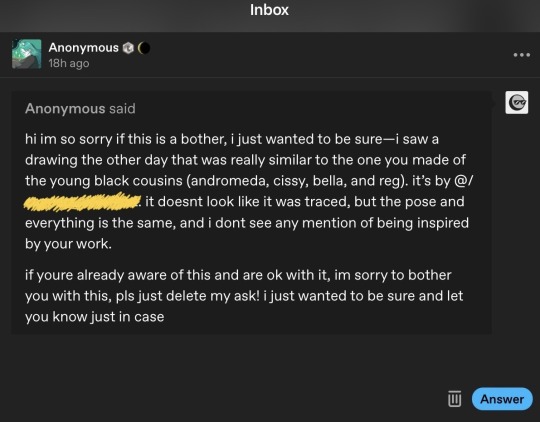
First: thank you to the anon here and the other many people who brought this to my attention! I know you did it out of support of me and I love you for it.
I was ready to keep it private as I didn’t want anything negative to come up and be associated with my art. But as I was asked across different platforms concerning the art in question I realized it really bummed me out. I’m here to have a good time in the fandom and create with you all. We have a good thing here in the community and I didn’t want any smoke with another artist - a mutual even.
So to help me feel a little better about it I want to turn this into an opportunity to teach others on the differences between Reference, Inspiration, Reinterpretation, and Theft
Reference: (usually) a visual source of information in order to better understand something. Example here is of my reference board and the art I am currently working on.
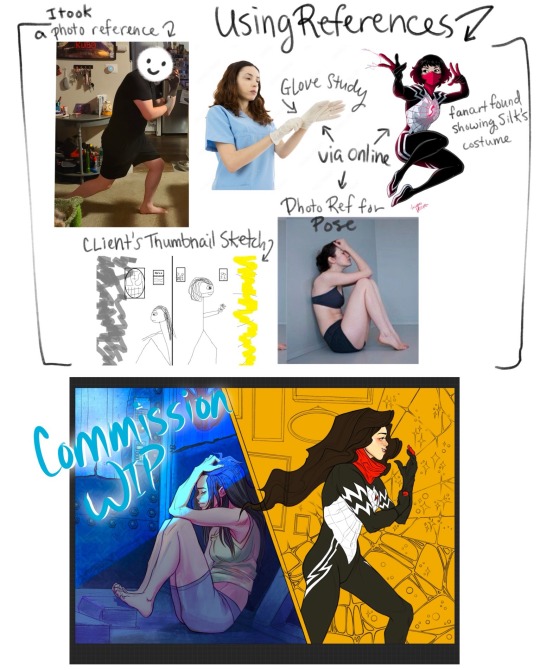
My favorite example of a professional using reference photos is by Hirohiko Araki (creator and artist of JoJo’s Bizarre Adventure), who uses fashion editorials and photoshoots ALL the time it’s awesome - tysm @yumiaiyuma for showing me this goldmine
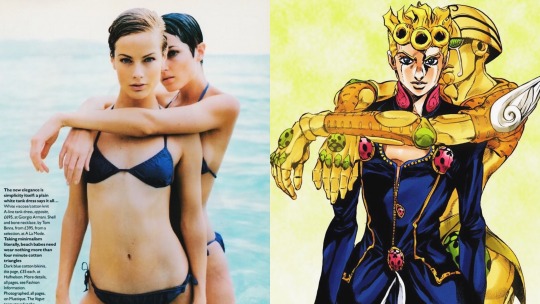
Study and Inspiration: here is a great example from the wonderful Stephanie Pepper. Notice the caption stating these are studies, the movie it is from, and I will even go on to say that this artist is influenced or inspired by the prolific works of J. C. Leyendecker (but what’s key is that Stephanie Pepper has developed and practiced to the point of deviating from his work and become a style of art completely her own - and she’s so recognizable in my opinion!)
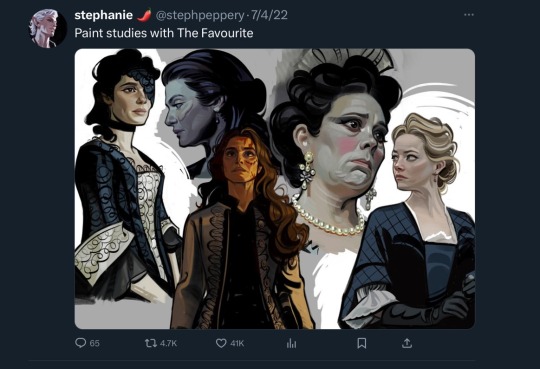
Personal Example for Inspiration:
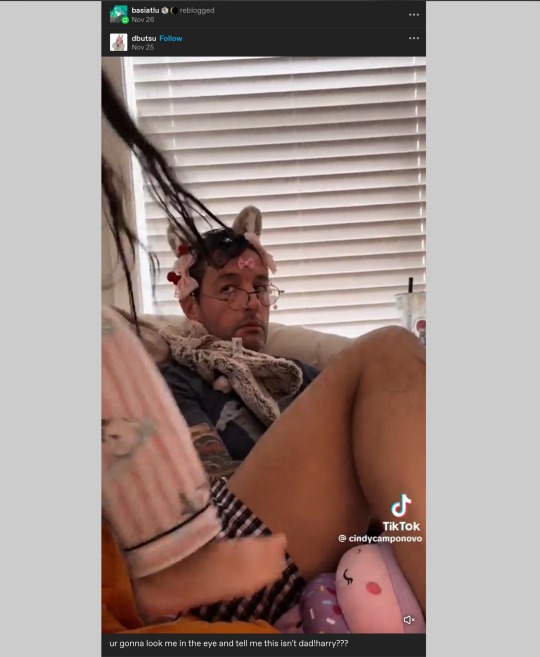
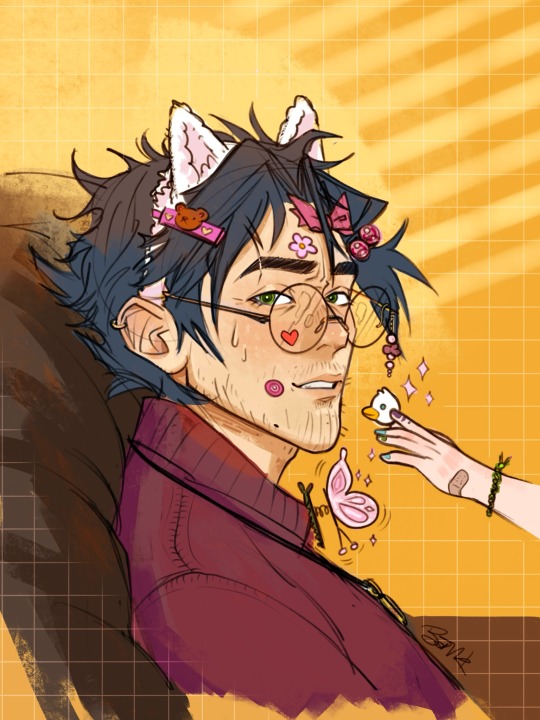
An Example of Reinterpretation: note - Both these classical artists whose works are being recycled are dead and no longer missing out on potential work and income. Where stealing ideas and art from current artists hurts them financially and mentally and emotionally. Howl as The Fallen Angel by _mimimaru on Instagram is an interpretation of a 1847 painting by Alexandre Cabanel and is now considered public domain // the Mickey Mouse self portrait was by Charles Boyer and is a parody of the famous illustration by Norman Rockwell and was commissioned by Walt Disney, himself.
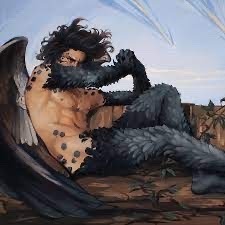
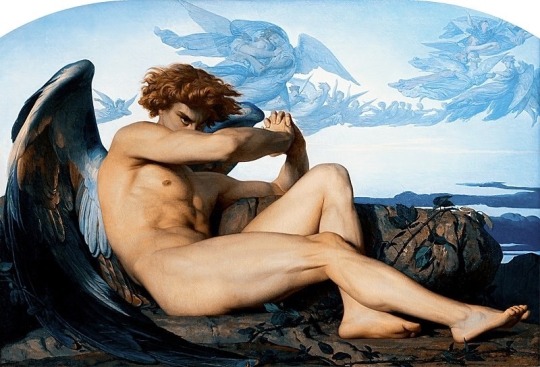
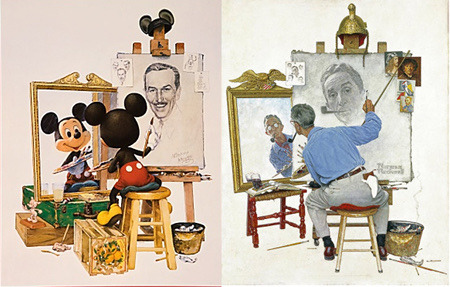
Now here’s the part that is concerning to several people, myself included.
Recently, an artist found the reference I used, and decided to draw Andromeda, Bellatrix, Narcissa, and Regulus staring at Sirius getting supposedly punished by Walburga Black off screen.
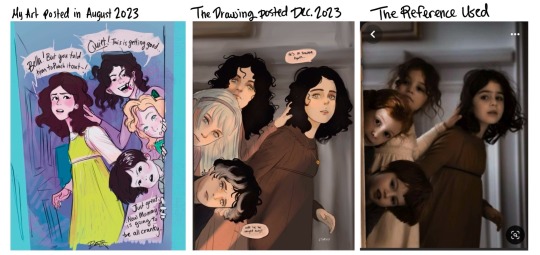
Let’s be clear: this isn’t a matter of tracing or claiming my image as their own. I do not mind at all if myself and another artist end up using the same reference. It happens all the time. Referencing and studying is not stealing. Reinterpretation is great for meme art challenges and paying respect to old classics. Even being inspired and doing one’s own version of another artist’s idea is totally cool, especially if you tag and/or shoutout the artist that inspired you.
I genuinely love and appreciate everyone who has brought this to my attention and who has been supportive and defensive of me with this. That reaction means more to me than anything else in this whole ordeal, if I’m being honest. So thank you all so much, with all my heart.
In closing: Do I hope this is all one gigantic coincidence? Absolutely. It’s one of those very uncool things that hurts my heart as an artist. I just want everyone to enjoy art and inspire each other so we can all grow. I do not want any malice to come from this either. I just wanted to inform everyone that I am aware of this, and give some of my thoughts on it. I also wanted to use this as a way to educate everyone on artistic process and why these things might happen sometimes.
Edit: me and the artist have chatted and we see it as a silly coincidence ♡ and honestly I'm happy and so relieved with that. But I think a lot of this info is still good to be mindful of in a creative community where we circulate ideas and content regularly.
145 notes
·
View notes
Note
Zoomer Huey, I tend to see people saying why Gen z don’t have sex much.
Holy
Fucking
Shits
These journalists surprisedly have WORSE self awareness than there boomer relatives
Here a hint https://x.com/swannmarcus89/status/1762582001507323991?s=46
And gender dynamics are…nuked in the fields they are surveying. Women and girls are told that all men are predators and misandry is left unchecked
Also, why Hollywood act surprised about the sex abuse?
We all heard about the casting coach, and how suspiciously people from working class backgrounds like Micheal Jackson (yes his dad had his music connections. But essentially mj was a slave and was arguably was the first black child star unless I’m missing someone) and Walt Disney (though not as bad) are painted as monsters while the actual monsters are protected for decades
I mean look at Judy Garland, she was a sweet person and she did help the LBGT in Hollywood and supported the civil rights movement
But her “crazy” behavior makes more sense because she was sexually abused at a extremely young age
And she not the only one, Shirley Temple, the boy who played at the first LA Dennis the Manis
Oh and the Peter Pan actor (a lot of people leave out the part where ALL of Hollywood basically says he can choke and die because he was “too” Disney)
But sorry about the Gen stuff, but the false rape accusations, maybe if you guys didn’t view men (especially white ones) the same way Nazis viewed the Jews while saying all the working class men were Weinstein.
My Gen would have more sex
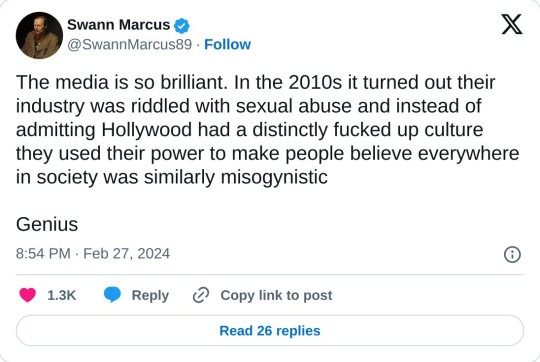
Entertainment industry has been like that since the beginning of forever, probably less so when women weren't allowed to participate but still a thing I'm sure.
As for Judy Garland it was nice to see people come out swinging in her defense when someone tried to start shit over well
She was not in control of her carer, saying no was not an option for her with this, but dumbasses that can only think in terms of today's standards never think about that.
Jay North (Dennis the Menace) did ok, so did Shirley Temple, plenty of others not so much, more recently we can look at Drew Barrymore and RDJ who both had fairly public meltdowns and problems.
Drew was ruined since her first film was ET and Spielberg takes care of the kids on set, going beyond the legal requirements.
Bobby Driscol was the Peter Pan VA top of his Wiki article.
Robert "Bobby" Cletus Driscoll (March 3, 1937 – c. March 30, 1968) was an American actor who performed on film and television from 1943 to 1960. He starred in some of the Walt Disney Studios' best-known live-action pictures of that period: Song of the South (1946), So Dear to My Heart (1949), and Treasure Island (1950), as well as RKO's The Window (1949). He served as the animation model and provided the voice for the title role in Peter Pan (1953). He received an Academy Juvenile Award for outstanding performances in So Dear to My Heart and The Window.
He just fell into the child actor pit, where he wasn't "cute" anymore couldn't get gigs and couldn't adjust to not being in the spotlight, the way he went and nobody knowing is awful to think about still.
Jackie Coogan, on the other hand was a different story.
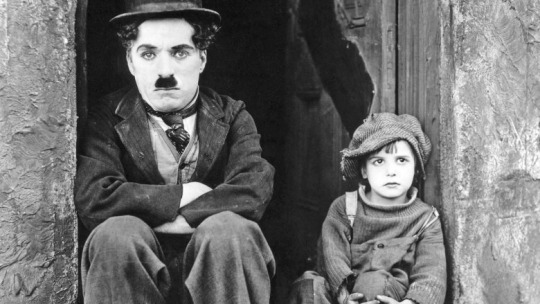
His parents sucked and as a result there's a series of laws named after him California's Coogan Law all about protecting the earnings of child actors from their parents. % goes into a trust iirc.
He ended up OK in the end though

The false accusation thing, #me too hurt women because #believe women was taken advantage of to such a degree that even this coming out to light
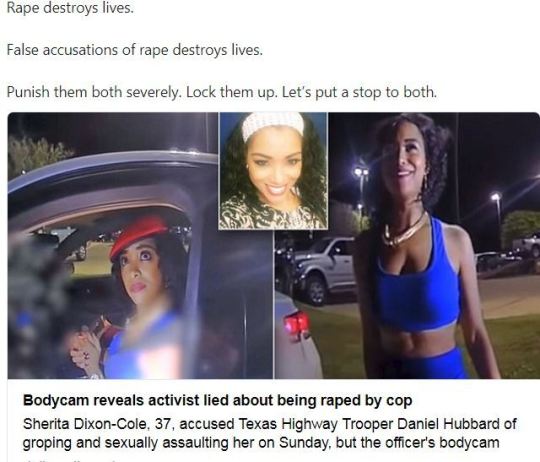
has still probably not cleared up for the trooper, and men are opting to not mentor women because of not wanting to risk a false accusation, everyone screams about how rare they are, to which I say so what, why should they assume the risk even if it's minor
Former VP Mike Pence came out and said he won't be alone with a woman that's not his wife in order to ensure that there is no possibility of someone making a claim of impropriety.
And he got this response
Why is anyone going to put their neck on the line when something like what he said is going to get this kind of response.
Maybe instead of crying about how rare false accusations are they should focus on shaming the people making them and coming up with solutions to keep them from happening.
You know instead of blaming the victims of the false accusations.
All this and so much more going on that isn't in this ask goes to the I don't blame people for not having as much sex, it's actually kinda nice too, fewer std's this way.
I went on a couple tangents, hope that's ok
49 notes
·
View notes
Text
The frustrating thing about being a Disney adult is that sometimes Disney will make a decision or an announcement I don’t totally love (tearing out Tom Saywer island and the river to fit in cars and villains) but I remain generally optimistic about the overall thing (I’m very excited for cars and villains) and even though my feelings are sort of complex I basically have to settle into full Disney defense mode and get ready to act like it’s the best idea ever because when you go on Twitter everyone who’s mad about it is straight using fascist dog whistles. I don’t think it’s really a known thing outside of Disney people just HOW MANY staunch Disney people, very specifically Magic Kingdom people, are extremely extremely right wing. The biggest Disney passholder group that has over 300K members is run by a man who wears custom trump shirts and ears to the parks, posts photos of himself wearing them, and then starts going ARE YOU TRIGGERED? IT’S JUST A SHIRT when people point out to him he’s breaking the “no political posts” rules HE SET in his own group. I’m not super jazzed to be losing Tom Sawyer island but any time Disney does something like this if you dig into the pages of almost anyone who’s Extremely Loudly Angry they’re busy CLAIMING it’s because Nostalgia and Sightlines ans Park Design but when you scroll for five minutes it becomes increasingly obvious that they’re actually pissed off because Magic Kingdom is very slowly removing the bits which uncritically play acted some very dark parts of America’s history and while I honestly don’t think Disney actually gives a shit and won’t give them the credit to claim they’re doing it on purpose, the people who are upset about it very much always are even if they don’t quite know it. It’s very very hard to articulate without actually being inside it but there’s this very specific contingent of people who get EXTREMELY UPSET about these sorts of changes and use extremely charged language like “shameful” “disgraceful” “dancing on someone’s grave” “Disney is dying” about a theme park ride that makes it very obvious they are in fact just deifying some fantasy idea of squeaky clean white conservative Americana and they’re very very angry about “tradition” and “legacy” and “removing what matters” but suddenly get realllllly uncomfortable and completely unable to pin down exactly what “legacy” we’re losing. And I know it sounds like it’s not that serious but I ASSURE you it is. If you go scroll almost any Twitter account that’s like, unhealthily angry about the removal of Tom Sawyer and start reading their posts deeper I absolutely promise you they will all be about how we’re “losing American history” and “Disney hates America” and “this is a disgrace to Walt’s vision” and like straight up posting photos of old plaques from Frontierland that talk about the great American colonizing spirit of faith in god and going “I wonder why Disney hates this now 👀👀👀” as some sort of stupid conservative gotcha. Like yes I am quite unhappy they’re taking out Tom Sawyer island because I fucking love those spooky ass caves but I have no intention of saying that out loud because I want absolutely nothing and no association with the spectacularly loud group of people who are using Theme Park Drama to post literal fascist dog whistles and whine about how they’re Erasing Your History. Shut up
13 notes
·
View notes
Text
How to Stick to the Point About Rachel Zegler and Snow White
"Rachel Zegler is just an actress doing her job, Disney is the one to blame for the Snow White changes!"
Just because she didn't write the changes doesn't mean she's not responsible for the words that come out of her mouth and the tone in which she says them. If anything, her skills as an actor, which usually include control over intonation, make her even more responsible for tone and attitude, not less.
Disney didn't write her a script for her interviews that said "now include a childhood memory that insinuates a negative opinion of the original Snow White!"
If you want to make it about how well she's doing at her "job..." She's not being professional: if her goal is to promote the new movie, alienating fans of the original is the worst way to accomplish that goal.
"Why are you attacking her just because she doesn't like the original? Lots of people don't like the original!"
The problem isn't that she doesn't like the original. Harrison Ford didn't like Han Solo, and he did a great job playing Han Solo anyway: because he understood the character, even if he didn't like him. Zegler is demonstrating that she doesn't understand the original movie, and doesn't like it based on that misunderstanding.
"You're just criticizing her because you're racist!"
Not really, because the point of Snow White as a character is pure love and pure innocence: and that point has been retold across all cultures. Rachel Zegler's skin color takes very little away from the role: it has nothing to do with her comments. Why are you making everything about a person's race? Kind of racist of you.
"You're just criticizing her because you hate women!"
If I hate women, why am I defending one of the greatest female characters of all time?
"Snow White is a movie where the Prince has to save Snow who does nothing but sing and dream of being rescued. It SHOULD get an update!! You're just worshipping the old one because you hate empowered women."
You don't understand the original movie. Snow White is a movie where the main character has faith that pure, innocent love will find her even when the odds are impossible.
She is the only character in the movie, contrasted with Grumpy and the Queen, who is genuine and doesn't hide what she is, because she's not afraid. She has several lines in the movie pointing that superpower-of-character-strength out. The Queen is afraid everyone will see how ugly she is in the inside if she's not Fairest of All. Grumpy is afraid his tender heart will lead to heartbreak so he hides it with grumpiness. Snow White hides nothing. She's the strongest character in the movie for that reason.
Again: Snow White IS an empowered woman: she's empowered with strength of character that can't be broken or twisted by circumstances even as a child. My definition of power is just different (and truer, and more powerful) than yours.
The Prince has two scenes: one where he falls in love with Snow White and promises to give her his heart in one meeting because that's how amazing she is, and the other where he fulfills that promise. His "effect" of waking her up wouldn't have happened without her "cause" of being a worthy enough woman to love.
They're not just "reimagining" the old version: they're replacing it. They're claiming to fix what's "broken" about the original. Therefore attacks on this movie are not attacks against the patriarchy or attacks against bigotry: they're attacks against the previous VALUES of faith, innocence, and the worthiness of pure love. Love that doesn't have to fight because it's powerful enough on its own. Faith that isn't corroded by circumstances. Innocence that doesn't turn bitter and inspires others. That's what they're saying is "broke" and trying to fix.
Do not let people derail the actual argument. Stories matter because they represent values. Values shape a culture. Rachel Zegler isn't a target: she's an example of what's happening in the culture, and makes a good entryway into talking about it. Don't get it twisted.
#Snow White#Snow White and the seven dwarfs#Snow White 2024#Snow White and the seven dwarfs 1937#Rachel Zegler#Rachel Zegler defense#Rachel Zegler hate#Greta gerwig#gal gadot#Walt Disney#Disney#Disney live action remakes#discourse#meta#culture#pop culture discourse#pop culture#celebrities
154 notes
·
View notes
Text
More handwriting analysis
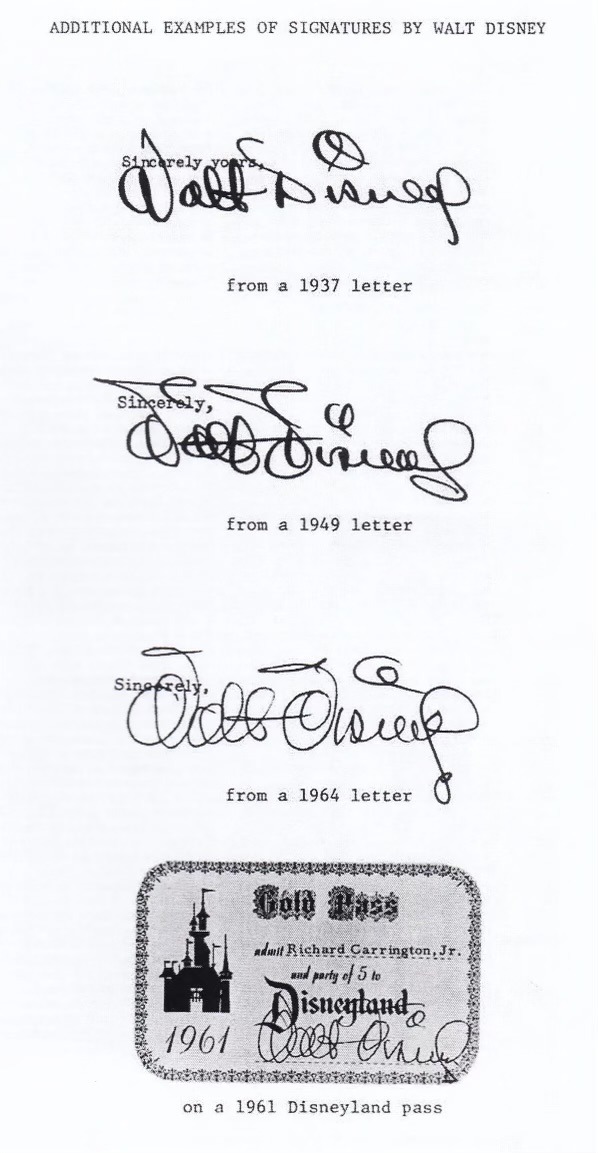
holy fuck Walt Disney was interesting.
1937
He likes to think and is pretty imaginative. He's immature and in a bad mental state. He still has some passion though and he's impulsive at times. He's defensive but I don't think he has a reason.
1949
By now he has an inflated ego. He's kind of stopped caring about how he comes across. He's still immature but he's more impulsive now. He's not in that bad mental state anymore though.
1964
He's still egotistical if a little less. He's been getting more impulsive with time. He has strange ideas and strange desires. Someone will stab me for pointing it out I think but he probably had some sort of fetish and. Very sex drive.
6 notes
·
View notes
Text
I Swear Mickey Did Not Abandon a Woman in Hell For Over A Decade (In Defense of Kingdom Heart's Mickey Mouse)


Excellent question! @notbrucewayne48 and @mintchocolatemagic , Mickey Mouse did not do anything wrong, and I will explain why.
Firstly, please leave you The Walt Disney Company-based opinions of Mickey by the door. If you have negative opinions of Mickey as a result of him being the mascot of an evil all-consuming corporation, those don't really apply here. Mickey Mouse, in Kingdom Hearts, is the king of Disney Castle and a talented Keyblade Wielder.
People seem to have a lot of animosity towards Mickey Mouse in Kingdom Hearts. Maybe its because his reputation has been ruined by the corporation he represents, I can't say for sure. It's fine if you don't like the guy or think he's annoying, but it personally grates on my nerves when people let that color his depiction and actions in the Kingdom Hearts franchise.
This post ended up pretty long, so if this is way too long of a post, I recommend reading the first two paragraphs, watching the video, and reading the last paragraph. Maybe not as good as a TL;DR, but it should give you enough context and understanding without taking up too much of your time.
Beyond this point, SPOILERS for basically the entire Kingdom Hearts series up to KHIII, excluding the mobile games.
To begin with, what am I even on about? That title is a pretty extreme and ridiculous statement, after all. So, here's the plan: I'm going to show you the clip, and then we'll go through the relevant points on the timeline to examine the truth of this claim.
Here is the claim, made by the supposed victim herself: Keyblade Master Aqua.
youtube
Aqua claims that Mickey abandoned her in the Realm of Darkness, knowing full well what a decade trapped there would do to her. However, her statements contradict reality at multiple points, likely due to the effects that sustaining an attack filled with darkness and being submerged in the waters of The Dark Margin, as well as the mental toll of being stuck in the Realm of Darkness for over a decade.
To figure out where everything went wrong, let's turn back the clock by about 11 years, to see where this all started.

At the end of Birth By Sleep, a prequel taking place a decade prior to KH1, Aqua is with Mickey in the tower of the wizard Yen Sid. Following the final battle at the Keyblade Graveyard against Master Xehanort and Vanitas (we'll get to them later, don't worry), Aqua and her friends are in bad shape. Aqua was really the only survivor, with Terra going missing and Ventus' heart being shattered, leading it to sleep elsewhere until it could recover (we'll get to them as well). Mickey, Aqua, and Ven were blown away after defeating Vanitas and destroying Xehanort's attempt to forge the X-Blade (Pronounced the same as Keyblade, and good lord we will get to that later), and Mickey brought Aqua and Ven to Yen Sid.
Leaving alone, and not really having told anyone at the tower where she was going, Aqua returns to her old home, the Land of Departure. There, she drops off Ven's sleeping body, and uses the Keyblade of her now-deceased Master to transform the land into a confounding castle that we'll come to know as Castle Oblivion. Following this, she senses Terra's voice and goes to a world called Radiant Garden. It is here that Aqua discovers the truth of Terra's disappearance. Terra had been manipulated throughout his journey to be consumed by darkness, which Xehanort took advantage of. Using his own Keyblade, he removed his heart and sent it into Terra's body, possessing it.
Long story short, Aqua won the fight but failed to free Terra, and he began to sink into the darkness. Aqua dove in after him, using her Keyblade Armor to protect herself and her glider to attempt to get herself and Terra out of the darkness. Realizing that herself and Terra were too heavy and wouldn't make it out in time, Aqua sent Terra ahead with her Keyblade and armor, launching him out of the darkness as she sank into it.

This will be very important later, so remember it, I won't be getting into it in this post, but it will come back later.
This is where she spent the next decade, wandering through the Dark World and the remnants of worlds that had fallen into the darkness, plagued by hallucinations, phantoms, wave after wave of Heartless, and even a dark reflection of herself that pointed out all of her mistakes and gave a voice to all of her intrusive thoughts.
Mickey didn't know where Aqua went, and it isn't easy to just enter the Dark World, so he was not able to find her. Between being the King of a world and training to become a Keyblade Master, he likely didn't have time to look for her forever, either.
Do we see Aqua sitting around waiting for help to come, as she claims? Nope.

... 0.2 - A Fragmentary Passage is an interesting game.
Anyway, silly new accessories aside, we see Aqua traveling though the Realm of Darkness, enduring the previously mentioned hardships. Here, she encounters Mickey, who slipped in via a world that was in the process of falling to darkness. He explains that the worlds are in trouble, and that he is searching for a Keyblade of the darkness, a counterpart to Sora's that will allow them to seal the Door to Darkness.

This coincides with the ending of Kingdom Hearts 1. After battling through more powerful Heartless, Aqua and Mickey see Riku running towards the Door to Darkness, and are beset by a Demon Tide, a powerful storm of basic Heartless known as Shadows. Aqua attempts to hold them off, which allows Mickey and Riku to assist Sora, Donald, and Goofy in sealing the Door from their side. Aqua tells Mickey to go on without her, before losing control of the Demon Tide and getting swept away. Her ending monologue is resolute, however, prepared to face the darkness and act as a guiding light for whomever finds themself trapped in the Realm of Darkness next.
Not only was this Aqua's choice, her sacrifice, but she stood by it. So what happened, and why didn't Mickey return for her immediately? The simple answer is that Mickey had a lot of more urgent things to worry about than assuming a Keyblade Master couldn't take care of themself.
Immediately after this, Mickey needs to look after Riku and get them out of the Realm of Darkness. This leads into Re:Chain of Memories.
Sora and Co. could help, except that they had their memories tampered with, and will spend the next year asleep while false memories are removed and their forgotten memories are put back in place.
Riku has been struggling with the darkness throughout KH1 and Re:CoM, so he isn't in the best place to be thrust back into the darkness.
Over this next year, the threat of creatures called Nobodies and the sinister Organization XII rears its head, and Riku doesn't exactly get better with his darkness.
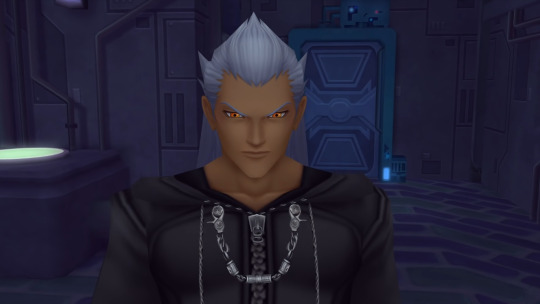
Forced to rely on the darkness, Riku transforms into the spitting image of the man who used his darkness and possessed him - Ansem, Seeker of Darkness - and this isn't exactly great for his mental state, either.
Sora was weakened by his journey through Castle Oblivion in Re:CoM, and with the threat of the Organization looming, the hero had his work cut out for him before Mickey would even dare asking him for help.

Sora and Riku, who has finally gotten his darkness under control, end up at the Dark Margin by the end of KHII, but do not encounter Aqua there. Since Aqua was not there, the attack that overwhelmed her with darkness and sent her flying into the water that was mentioned earlier must have happened between the final world of KHII and this scene. They manage to escape, and return to the Realm of Light.
Sora and Riku rest back at their home, the Destiny Islands, during the events of Re:Coded, and eventually receive a message from Mickey calling them to Yen Sid's tower. These boys need to get better, hopefully becoming Keyblade Masters, in order to rescue the fallen Keyblade Wielders from their fates and prepare for the upcoming final battle. Dream Drop Distance comes and goes, and Riku is named a Keyblade Master.
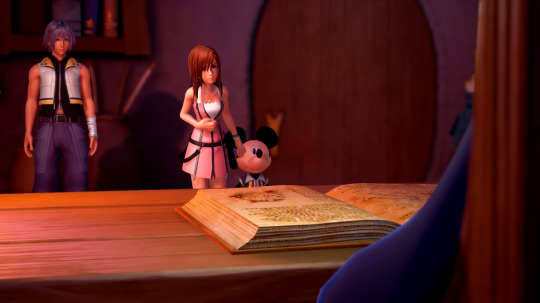
Prior to the events of Kingdom Hearts 3, Mickey relays his experience in the Realm of Darkness with Aqua, to which Riku angrily questions why Mickey never told him or attempted a rescue.
You should know the answer to that by now.
Mickey explains that he respected Aqua's wishes, just as he did for Riku in the past, stubbornly refusing to tell Sora anything about his missing friend during KHII, as Riku was dealing with the whole Ansem and darkness thing and made Mickey promise not to tell Sora.
Yen Sid also chimes in, pointing out that if Sora and Riku had found out, they would've recklessly tried to find a way into the Realm of Darkness to stage an ill-fated rescue mission.
Now, however, the time has finally come. Since Mickey's Kingdom Key D is a Keyblade from the Dark Realm, he could use it to enter the Realm of Darkness without having to use the incredibly unreliable and dangerous method of waiting for a world to fall into darkness.

Mickey and Riku suit up in some new darkness-resistant threads made by Yen Sid and the Three Good Fairies (of Sleeping Beauty fame), and set out for the Dark Realm.
This doesn't go well, to say the least, leading to Mickey and Riku's Keyblades being damaged. Mickey's is recovered and used to create the Star Cluster (which Aqua can be seen picking up in the video shown at the beginning of this post), while Riku leaves the pieces of his behind and recieves a brand-new Keyblade.
Second time's the charm, and now we are all caught up to the aforementioned clip from KHIII.
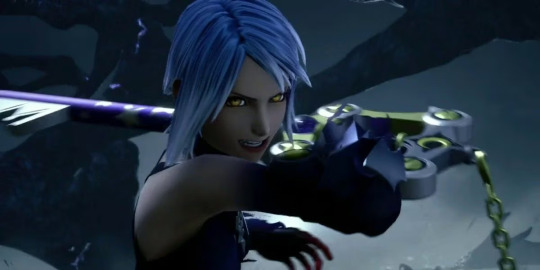
Anti-Aqua happens, Sora shows up via the power of friendship and following his heart (oversimplification, you know KH isn't that simple), and Aqua is finally rescued from this dark hell.
So, to wrap it all up, Mickey very much did not abandon Aqua. Aqua disappeared off the face of the worlds - literally all of them - for ten years, sacrificed herself to protect Mickey, Riku, and the worlds when Mickey finally did find her, and then Mickey simply did not have the time or resources to stage a rescue mission that actually would've worked in the year or two following his original trip in the Realm of Darkness.
Thank you for joining me on this rather long-winded case. I feel like my writing ended up being a little stiff due to all of the recapping I was doing, so if you have any critiques I would love to hear them!
Until next time, may your heart be your guiding key.
#kingdom hearts#kingdom hearts 2#kingdom hearts birth by sleep#kingdom hearts re:chain of memories#kingdom hearts 0.2 birth by sleep fragmentary passage#kingdom hearts 3#kingdom hearts spoilers#kingdom hearts 2 spoilers#kingdom hearts re:chain of memories spoilers#kingdom hearts birth by sleep spoilers#kingdom hearts dream drop distance#kingdom hearts dream drop distance spoilers#kingdom hearts 0.2 birth by sleep fragmentary passage spoilers#king mickey#kh riku#aqua kingdom hearts#wowowow that was a lot#I had a lot of fun going through all this#I don't know why Im so passionate about KH mickey lol#Maybe a post about all of the cosmetics in Fragmentary Passage would be fun lol#let me know if you want me to talk about the saddest dress-up game to ever exist#Youtube
21 notes
·
View notes
Text
Top 10 Appearances of Cruella De Vil
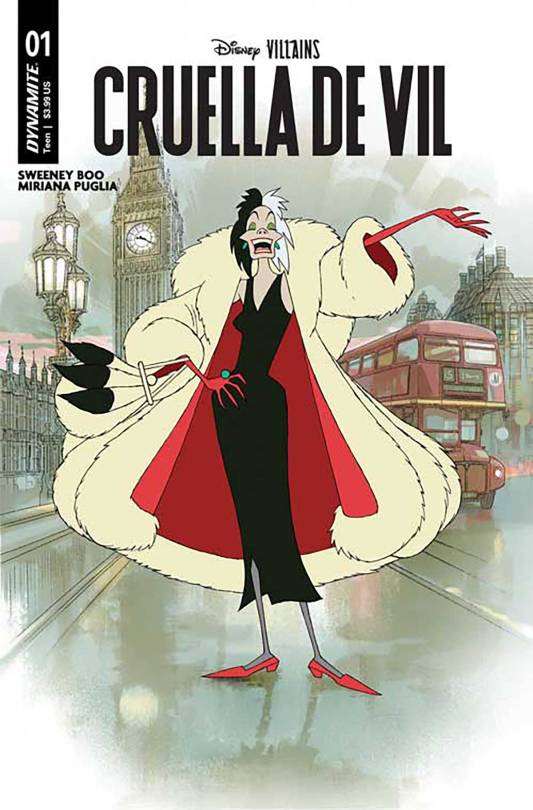
Last year, to the date, was the 100th Anniversary of the Walt Disney Company. That makes today their 101st Anniversary. I’d say that means there’s no better time - given this is also the spooky season - to talk about one of their greatest villains: Cruella De Vil, the nasty “devil woman” from “101 Dalmatians.” Cruella is one of the most interesting villains in the Disney canon, because of how…well…ordinary she is. In the original film, at least, she’s not someone who has massive amounts of magical, political, or warrior-savvy power; she’s a very normal, mortal woman. What makes Cruella such a great villain is her wild personality: she is utterly despicable, downright repulsive, in her goals and desires, but she’s so entertainingly bizarre in her mannerisms and appearance, it’s hard not to be entertained by her. She’s both glamorous and wretched at the same time, and you find yourself laughing both with her AND at her throughout her time onscreen; she’s thoroughly insane, thoroughly over-the-top, and it’s hard not to say she’s memorable. Top it off with a catchy song all about her vile ways, and it’s not surprising she’s stuck in the popular consciousness as long as she has. Over time, Cruella’s star has only grown, for a lot of reasons. She’s widely regarded as one of Disney’s finest baddies, and hardly any gathering of Disney Villains feels complete without at least REFERENCING Cruella in some way. So - much as I’ve done in the past with three other great Disney Villains (the Evil Queen, Maleficent, and Scar) - I felt today we should pay homage to everyone’s (least) favorite fur fanatic, and talk about some of her greatest appearances BEYOND her initial movie. Park attractions, spin-off films and TV appearances, books, video games…if Cruella has appeared, it can count. So, let’s not waste anytime, daaahlings! Here are My Top 10 Favorite Cruella De Vil Appearances!
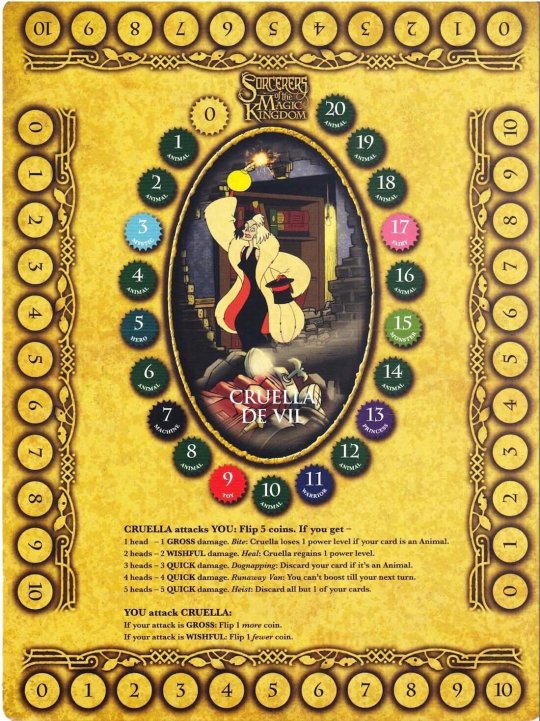
10. Sorcerers of the Magic Kingdom.
You’ll be seeing this entry pop up a lot of times, whenever I talk about the appearances of great Disney Villains. (Not always, but a lot.) I mentioned it before on my list for Maleficent, but for those who don’t remember or just haven’t heard of it: “Sorcerers of the Magic Kingdom” is an interactive attraction at Walt Disney World, wherein guests are sent on missions by Merlin around the Magic Kingdom. Hades, it seems, has come up with a new scheme to try and - of course - take over the world, and he’s summoning various other great villains to help him with his scheme. The players must battle these villains and retrieve pieces of a magic crystal to stop Hades and his evil allies. Among the villains featured in the experience is Cruella, who makes a deal with Hades to help him find part of the crystal; in return, he will make sure she gets all of the dalmatians. The pair arrange to work under cover of the fireworks spectacular that evening, so must race against time to help the Dalmatians and Merlin before Cruella and Hades can enact their devilish plot. This results in a boss battle against Cruella, where she uses the most logical method of defense against the players: GIANT FREAKING CARTOON BOMBS. Yeesh, I know Cruella can have an explosive temper, but this is ridiculous!
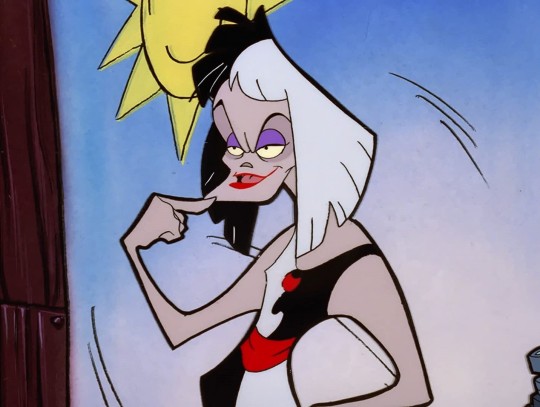
9. April Winchell, from 101 Dalmatians: The Animated Series.
Also kudos to Tress MacNeille, who took the reins for Cruella in two episodes when Winchell was presumably unavailable. Influenced by the success of the live-action films with Glenn Close, but set in their own universe unique from both the animated feature and the aforementioned live-action ones, this cartoon show softened up Cruella in a lot of ways. While her personality remained as flamboyant and deranged as ever, her obsession with furs and desire to kill the titular dalmatians was removed. Presumably, this was because it was considered too “politically incorrect” for a children’s show, aired in the mornings, on the Disney Channel, at the time. The series also changed the location from England to America. In the series, Cruella - much like in the Glenn Close movies - is depicted as the head of a fashion design company, “House of DeVil,” and her goal was to try and find a way to get the land where the Dearly family now live with their one-hundred-plus dogs, presumably for business purposes. This Cruella was a more comical villainess than ever before; a sort of female Dick Dastardly whose schemes were constantly loused up by a combo of her minions’ bungling, and various slapstick shenanigans. She was also given a somewhat sympathetic side, the first time I think anyone attempted this with Cruella; there’s even an episode that parodies “A Christmas Carol,” revealing a tragic past behind Miss DeVil’s diabolical nature. While this version of Cruella was and is a lot of fun, I personally prefer other versions - both from before and after it - a bit more, so it gets a lower ranking.
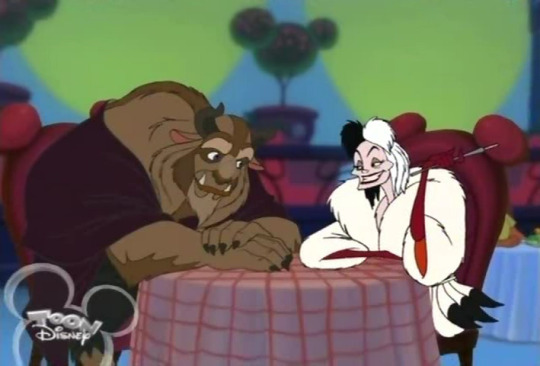
8. House of Mouse.
For those who don’t already know, “House of Mouse” was a series that Disney used as a vehicle for various short cartoons, most notably the Mickey Mouse Works series it had going on at at the time. It was a bit like Disney’s version of “Shining Time Station,” with the actual story of each episode, and the premise of the show itself, acting as a framing device to allow the cartoons to be shown. The series took place in a Toontown nightclub, the titular House of Mouse, run by Mickey and the gang. Here, every night, various animated characters from all across the Disney pantheon would come to hang out, have dinner, and watch some shorts. Cruella was one of the most frequent guest villains to pop up in the show. Her appearances were usually accompanied by humorous gags about her obsession with furs, such as her considering turning the Beast into a coat, or jokingly threatening Pluto. One of my favorite jokes was in the episode “House of Crime,” where a mysterious villain (later revealed to be the Phantom Blot) is stealing and kidnapping anyone and anything they could get their gloves on. At one point, Pongo and Perdita accuse Cruella of stealing their puppies (again), to which Cruella huffs: “One movie, and you’re labeled for life!” Probably her most noteworthy appearance was in the Halloween special, “Mickey’s House of Villains,” where Cruella was featured as one of the leading antagonists, helping Jafar and some of the other villains take over the House of Mouse. Overall, while Cruella rarely had a ton to do, her moments were always highlights for me, and while she may not have had as big a role in this show as she did in our previous entry, it’s more than earned strong points here in my book.
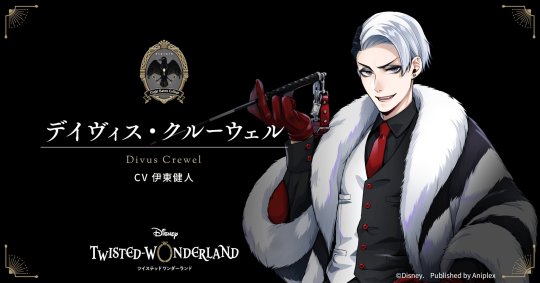
7. Divus Crewel, from Twisted Wonderland.
Well, I can’t make a list related to Disney Villains without bringing up this game, can I? In fact, I bet a lot of you who know about this little number probably expected Divus Crewel to rank higher. For those who came in late, “Twisted Wonderland” is a mobile game, originally made in Japan, wherein the main POV character gets “zapped” into an alternate universe. They find themselves at Night Raven College: a School of Dark Magic, inspired by seven of Disney’s greatest villains. The place is populated by characters all inspired by (and sometimes descended from) these villains, and even other antagonists. Cruella is NOT one of the Great Seven in the game, but nevertheless, a Cruella-inspired character does appear in the form of this rather handsome fellow. Divus Crewel is the resident science expert at Night Raven College, and is the youngest and newest professor on the campus, in charge of teaching potions class. The best way to describe Crewel is a combination of a military drill sergeant and…well…Cruella DeVil! He is a strict, commanding, almost soldier-like character, but he also has a passion for fashion, loves to drive fast sports cars, and has a flair for the theatrical. A scientist with the soul of a supermodel, and the bearing of R. Lee Ermey…I don’t know HOW they got this combination out of Cruella DeVil, but the end result is probably my favorite member of the NRC staff in the game. The main reason (though not the only reason) why “daaahling” Divus doesn’t rank higher is because, like most of the staff members, he’s not really THAT major a character. Professor Crewel has very little influence on the Main Story of the game. He has, however, appeared more prominently in Events (in fact, he’s even got a boss fight in one of them), and also has a couple of noteworthy moments in Vignettes for the other characters. I would argue he’s probably the most focused-on teacher at the school…and considering how popular his inspiration is, I guess that’s not a big surprise.
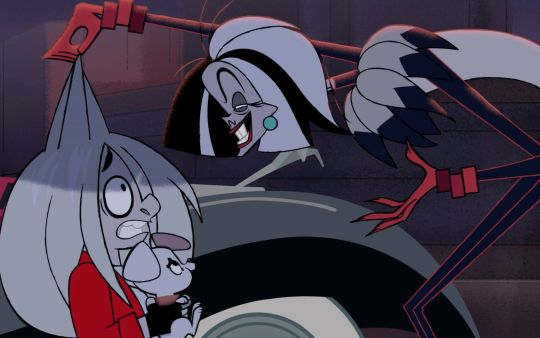
6. Michelle Gomez, from 101 Dalmatian Street.
Unlike the much earlier 1990s Animated Series, this show didn’t hold back with the darker elements of Cruella’s character. In fact, if anything, this series REALLY pushed making Cruella as unsettling and scary as possible. The series takes place in the same continuity as the original animated film, but much later down the line. Cruella is a latecomer into the show: for much of it, the main antagonist was actually her nephew, Hunter, who is working for evil aunt. However, Cruella eventually enters the plot properly, deciding to take the matter of revenge against the dalmatians and their owners into her own hands. Miss DeVil is much older now - even more skeletal and emaciated than ever - but she’s just as deranged and, generally speaking, just as spry as she ever was. She’s also just as determined to get those darn dogs! Her cruel and twisted nature makes for an interesting parallel to Hunter, who eventually redeems himself and becomes a friend to the Dalmatians. While she’s framed and depicted as particularly horrifying in this show, Cruella still has a lot of humor to her, as you would expect. Top it off with the voice of Missy from Doctor Who herself, Michelle Gomez, and it’s pretty clear why this is a triumph among Cruella’s post-1961 pop-ups.
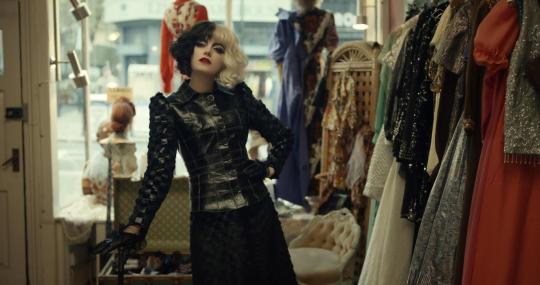
5. Emma Stone, from Cruella.
When this movie was released, it was advertised as basically being “Disney’s Joker.” This is a lie: if anything, I would argue this is “Disney’s Moriarty the Patriot.” (And if you don’t know what THAT is, look it up; I don’t have time to be your SparkNotes here.) Many have compared this to the earlier “Maleficent” movies, starring Angelina Jolie, both of which took classic Disney Villainesses and reimagined them as more sympathetic and protagonistic figures. Between the two, I would say “Cruella” is more successful in that regard. It’s clearly not setting itself as a “true story” in the way it presents things, instead becoming its own unique thing, and therefore it’s a bit easier for me to swallow the less villainous take on the character here, in terms of story. It’s also just a very stylish sort of film (fitting for the character), and I think stands on its own two feet much better than the Maleficent movies do. In this universe, Cruella is reinvented as an anti-hero; an aspiring fashion designer who seeks vengeance against an evil Baroness, who becomes a rival of hers in the fashion world. The Baroness, Cruella believes, murdered her mother. Through various means, the black-and-white-haired mad genius tries to undermine and ruin her enemy, riding a fine line between a criminal mastermind and a heroine. Emma Stone plays the character brilliantly, and there’s a lot of good stuff in this reinterpretation. It’s not a perfect movie, but it’s not a bad one, either. However, I think I prefer Cruella when she’s…well…Cruella, for lack of a better way of putting it. Still, I’d say the film is worthy of a space in Top 5, after some consideration.
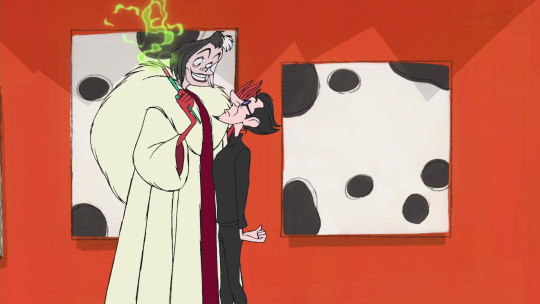
4. 101 Dalmatians II: Patch’s London Adventure.
In my opinion, “Patch’s London Adventure” is one of the few really good Disney animated sequels. While I still prefer the first film more, I’d say this a decent follow-up: it updates the humor in some fun ways, has great voice acting, captures the artistic style of the original film in an interesting way, and takes a fresh look at things while sticking true to the continuity of the original picture. One of the most fun parts of the story, of course, is Cruella’s role. In here, Cruella is the main villain, but actually only the secondary antagonist: for much of the movie, her role in things is peripheral, but after a certain point, she re-enters the main plot, and does so with a vengeance. It’s revealed that Cruella has gotten out on parole, but for various reasons, her already unstable sanity has begun to slip further than ever. She’s denied buying new furs, her car is completely totaled, her henchmen are imprisoned, and it’s hard to tell how much of her fortune she even still has access to. In short, she’s at the lowest point of her entire life. Things change, however, when an artist named Lars (played by Martin Short) falls in love with her. This is a result of Cruella taking interest in Lars’ work, which involves - what else? - black and white spots. However, their relationship begins to tank when Cruella starts to lose interest, and to try and rekindle things - and find what it is that’s missing - Cruella once again decides to kidnap the Dalmatians, with Jasper and Horace’s help. The reveal of her evil scheme in this film is arguably even more insane and horrifyingly twisted than her plan in the first film (I won’t say what it is here), and it’s clear by the end of the picture that Cruella has completely gone off the deep end. Thankfully, I think that’s where all of us like her to be.

3. Glenn Close, from the Live-Action Dalmatians Films.
Well, I can’t do a list about Cruella DeVil and NOT rank this one highly, can I? While Cruella was always a popular rogue in the Disney canon, I think most people would agree her popularity SKYROCKETED after Glenn Close took the reins in the live-action remake of “101 Dalmatians.” This was the movie that first reimagined Cruella as the head of a fashion design firm, with Anita as her ex-employee rather than an old school chum, and it really amped the lunacy of the character. Close doesn’t just chew the scenery in the first movie, she gorges on it in huge chunks, hamming up Cruella to an utterly ludicrous degree, but also still giving her the necessary menace required. Some have argued she’s a bit TOO over-the-top, but I kind of love how far they pushed Cruella’s melodrama here, as well as her madness. The second film goes even further: in “102 Dalmatians,” Cruella is sent to an insane asylum, where experimental procedures seem to cure her, transforming her from a psychotic animal killer to a kind and charitable soul. However, a freak incident reverses the process, and Cruella returns to her old ways, plotting revenge against those she deems responsible for her earlier incarceration, as well as seeking to recreate her plans for a Dalmatian fur coat. While the second film is not very good, overall, I felt that Cruella was just as much fun there as she was in the first movie, and Close is still highly lauded and recognized for the role to this day. It’s honestly hard to tell how many people like her more or less compared to the original animated version, at this point, which is high praise when it comes to Disney’s live-action remake output. Close has always spoken highly of the part, and so respected the character that she actually helped to produce Stone’s “Cruella” movie years later. That shows you, doesn’t it?
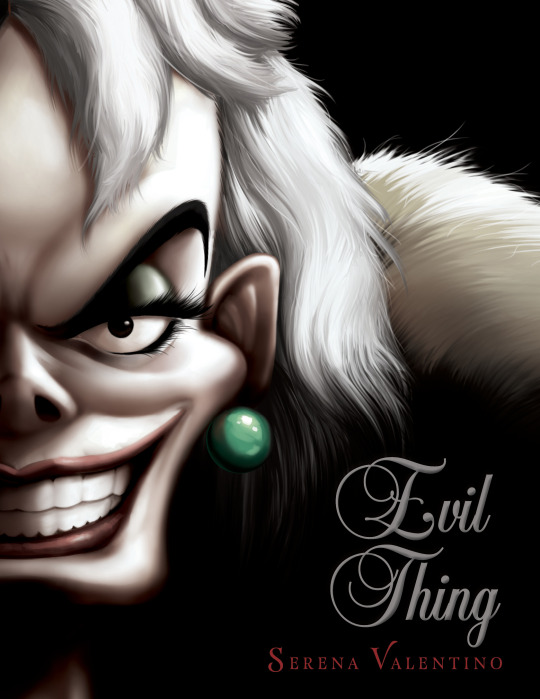
2. Evil Thing.
“Evil Thing” is part of a series of books, written by Serena Valentino, which go into the origins of many famous Disney characters (most of them villains), and show their sides of the stories they were in. Out of all of them, I think “Evil Thing” might be my favorite so far. It seems to be one of the most praised and popular, even receiving a graphic novel adaptation! The book tells us the story of how Cruella came to be the villainess we see in the original animated movie, and her story is…interesting. While Cruella is not depicted as a “bad seed” who seemed to just be evil from the start, she’s certainly not an angel; even from the very beginning of her life, Cruella is depicted as having a dark side, mostly due to her aristocratic upbringing. She seems to see other people as not only less than human, but less than REAL; she’s brought up to believe that her wealth and her status make her more valuable than any other human being without those things, and animals? Pffft. Forget it. They exist only to be food, furs, and so on. However, despite these darker aspects, Cruella doesn’t just start off as a wicked person; it’s a descent into madness and darkness that takes a while to fully germinate. The book is also told from Cruella’s POV, unlike other novels in the series, which are written in third person, creating a particularly unique perspective. It’s not only a great take on Cruella, but a good book in general, bringing us into the mind of a madwoman in a way that is frightening, fascinating, and at times wickedly funny…just the way Cruella DeVil should always be.
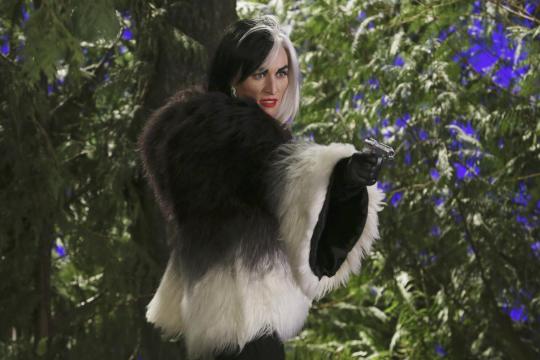
1. Victoria Smurfit, from Once Upon a Time.
While others may first think of Glenn Close or Emma Stone, when I ponder live-action Cruellas, this is the one I imagine and love first and most of all. In my opinion, Cruella is one of the best villains to appear in “Once Upon a Time,” and this reimagining of the character honestly rivals the original animated film for my favorite interpretation. Played by Victoria Smurfit (who, beyond this, I mostly know for playing the main villain of NBC’s “Dracula” TV show, of all things), Cruella is here has the power to control animals, emitting a green smoke that puts them under her thrall, in reference to her bad habits from the original. This power was given to her by The Author - a man with the power to control and change people’s stories - who fell in love with Cruella while traveling through the universe. In her origin story episode, we’re actually led to believe that Cruella was once a good person who somehow went bad; a sort of contemporary Cinderella or Rapunzel, kept under the firm heel of her domineering mother, who supposedly murdered her father. All of this, it turns out, is a sham: Cruella is depicted here as a truly rotten-to-the-core person. A psychopath from birth, who loves nothing more than killing. Her great goal in the series is to get back the thing she loves most, which is the ability TO kill people. That is so messed up, and I LOVE it: most of the other major antagonists in the series are depicted as sympathetic characters with tragic backstories. Several of them even eventually redeem themselves and reform. Cruella, however…she’s just bad news from day one, and LOVES her own wickedness. This version made Cruella equal parts scary and kind of hilarious, as she’s one of the most consistently funny characters in the show…yet the fact she is literally a blood-hungry psycho means there’s always a sense of danger when she’s around, and the moments where her inner steel shows can be quite startling. I don’t know how many other people would place this take on the character so high in the ranks, or what other people - fans and laypeople alike - think of this interpretation…but for me, there’s no doubt Victoria Smurfit in “Once Upon a Time” takes the cake as My Favorite Appearance of Cruella De Vil. “Cheerio, Daaahlings!”
Honorable Mentions Include…
Kingdom Keepers. (Cruella is one of the main villains in these books, first appearing in “Power Play.” She is the lieutenant of the Evil Queen, and - like in “Once Upon a Time” - has the power to control animals.)
Villains Tonight! (Cruella shows up to put on a fashion show during this now-defunct Disney Cruise Lines stage show.)
Escape from DeVil Manor. (A PC game based on the live-action films, but with the characters designed to resemble the original animated versions. I used to play this a lot as a kid. Cruella is mostly a peripheral figure in the story, but it makes the moments she shows up more special, and her specter - as it were - looms large throughout.)
“Disney Villains: Cruella De Vil” Comic Series. (One of the Dynamite/Disney crossover “Disney Villains” comics. Not as good as the others of these comics I’ve read, but still interesting.)
#disney#list#countdown#best#favorites#disney villains#cruella#cruella de vil#101 dalmatians#top 10#tv#film#animation#movies#literature
7 notes
·
View notes
Text
So recently I got a threatening anonymous message from a Disney Hater calling me a mindless corporate shill for defending an evil corporation that abuses its employees whose most recent works are nothing but soulless and corporate garbage made by greedy studio executives and that Vivziepop was an inspiration for starting an indie animation “renaissance” posing as a threat to them.
First of all, companies and corporations aren’t evil; they’re not but names and inanimate sheets of paper that state the exist as a business, the people who can run them can be evil, but they aren’t the company (it’s like saying that Putin is Russia itself, or that H!tler was Germany itself back in the 1930s and 40s).
Second of all, not all of Disney’s most recent works are corporate. Two examples in my opinion are the movies Elemental and Wish. Elemental was actually born as a passion project by it’s director Peter Sohn that was based around the story of his life as an American born from East Asian immigrant, and Wish is actually meant to be a metaphor for the Walt Disney Company and the corporatization of it and that the only way the company can thrive is by letting people’s creativity flow (which is a message that this idiot and all the other stupid people who hated the movie don’t realize).
Third of all, Vivziepop is actually an abusive employer. There have been tons of controversies surrounding her and SpindleHorse relating to the animators getting low pay, mean work environments, too high expectations, among many other issues, and these people are jumping to her defense whenever she receives even the slightest of criticism like they’re conservative 14-year-old boys defending Elon Musk: https://www.tumblr.com/thowawayuntilfurthernotice/723985134342307840/meanwhile-in-reality

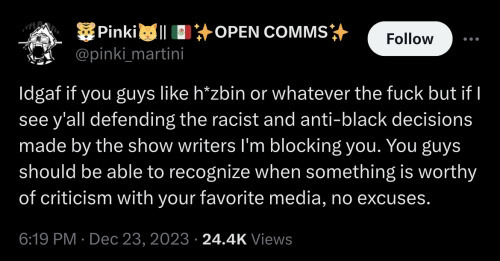
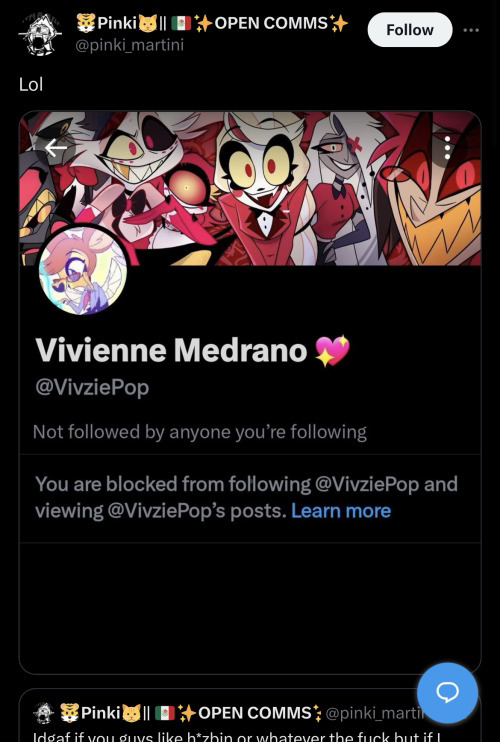
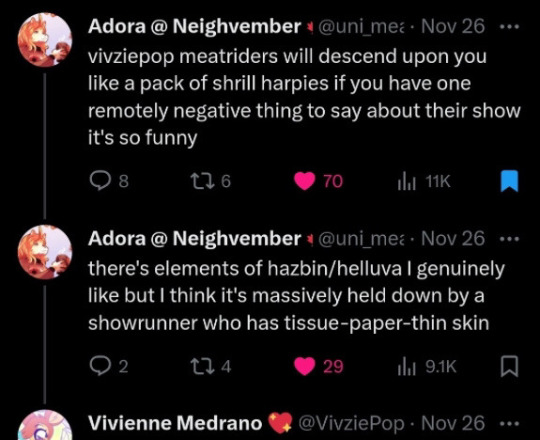
So yeah, call me a corporate shill if you want, it just doesn’t change the fact that the Disney Hatedom is a cult-like group that’s blindly supported by both sides of the political spectrum that are no better than fucks like Bob Iger and Bob Chapek.
#disney#hazbin hotel#helluva boss#viziepop#vivziepop is a bad writer#spindlehorse#vivienne medrano#vivziepop critical#vivziepop criticism#spindlehorse criticism#spindlehorse critical#animation#disney haters#the disney hatedom is toxic#disney haters are hypocrites#disney haters are bullies#hazbin hotel is overrated#helluva boss is overrated
24 notes
·
View notes
Text
DISNEY STUDIO AU: Donald Duck
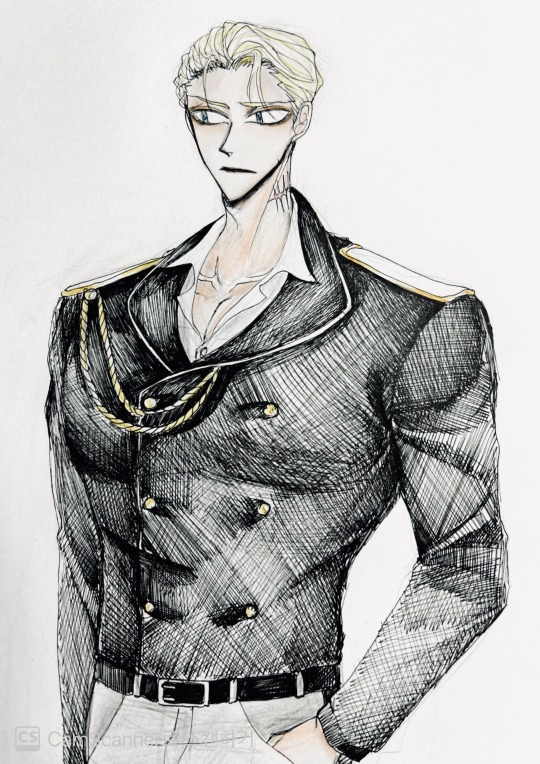
Full Name: Donald Fauntleroy Duck
Other Names: Don, Donny, Uncle Donald, Lieutenant Donald F. Duck
Schools: Duckburg Private School (graduated), Walt Disney University of Performing Arts (graduated)
Occuaption(s): Sub-vocalist and rapper of The Three Caballeros, Naval officer (rank Lieutenant; retired), actor, entertainer
Residence: Los Angeles, California, USA
Family: Quagmore Duck (father), Hortense McDuck (mother), Della Duck (twin sister), Huey Dewey and Louie (nephews), Scrooge McDuck (uncle), Ludwig Von Drake (distant uncle), Gideon McDuck (uncle), Matilda McDuck (aunt), Daphne Duck (aunt), Gladstone Gander (cousin), Fethry Duck (cousin), Fergus McDuck (maternal grandfather), Downy McDuck (maternal grandmother), Bolivar (pet)
Relationships: Daisy (girlfriend->fiancee->wife), Panchito Pistoles (best friend; fellow member of the Three Caballeros), José Carioca (best friend; fellow member of the Three Caballeros), Mickey (best friend), Goofy (best friend), Minnie (friend), Clarabelle (friend), Horace (friend)
Likes: His music/acting career, boats, hiking, hockey, dancing, singing, spending time with family, dates with Daisy, holidays, camping
Dislikes: Bad luck, his voice damaged, losing his temper, Goofy’s clumsiness, upsetting Daisy, unruly animals, his nephews in danger, his nephew’s chaotic mischiefs, anyone offending Panchito/José, his nephews stressing over grades
Donald Fauntleroy Duck is one of the famous celebrity and entertainer alongside Mickey and Goofy. Originally debuted as “The Three Caballeros” with Panchito and José at the end of his university year, he was once the sub-vocalist and rapper. Afterward, he joined the Naval army and his rank raised up to lieutenant. Later, he become an uncle and single parent of his three nephews; Huey, Dewey, and Louie while working as actor and an entertainer. Eventually, he returned to his singing career “the Three Caballeros”.
Donald was born as twin brother of Della Duck, being a firstborn of Quagmore the pilot of McDuck Airline and Hortense the bank worker of “The Money Bin” Bank. Born in a privileged and wealthy background, Donald was expected to meet the family’s expectation as one of the heirs of McDuck enterprises. The two others were Gladstone Gander and Fethry Duck, but Donald was the one who have been above Scrooge’s expectations as next heir as the rest didn’t for reasons; Gladstone was uncannily lucky, but a very lazy individual who would eventually bring the enterprise to downfall and Fethry didn’t show passion nor interest in the enterprises and has eccentric visions on the world. Nonetheless, Donald had a happy and adventurous life with his twin sister and Uncle Scrooge while his parents were constantly busy. However, things went sour when Donald found love in music and singing as he chose to attend the university majoring performing arts. There, he encountered José by helping him carrying his heavy musical instruments, quickly befriending one another. Then, they met Panchito as they found their band “The Three Caballeros”, active in USA, Central America and South America.
However, while preparing Europe Tour, he was attacked by stalker—who felt betrayed by him for dating Daisy—and got his neck injured forcing him to leave the group as he couldn’t sing. He was also one of very few to know of Goofy and Gloria having children as he attended Glory B’s funeral, growing furious when the journalists rudely interrupted the eulogy and disrespected Glory B, hence battering several as both self-defense and a warning. This caused him to take therapy sessions dealing with his anger management and decided to join the Navy. Through years, he have gained respect and admiration among the Navy soldiers/officers as they were devastated when he decided to retire to help his sister Della with her pregnancy. Meeting Mickey and Goofy again, he went to acting career and despite several ups and downs in works he starred, he earned much in order to raise his nephews while Della would travel the globe. Donald often receives phone calls from his family and relatives as Scrooge wanted him to move back to prime McDuck residence for him to take job within the family business, but Donald declined as he focused on raising his nephews. At some point, Donald married his fiancee Daisy.
One time, Huey, Dewey and Louie noticed Donald would silently tapping his limbs when listening to Panchito or José’s performances, learned of his past as one of “The Three Caballeros” and the incident that caused him to quit the band. Discovering his wish to perform as singer again, his nephews and Daisy contacted José and Panchito for help in order to collect enough money for his voice recovery surgery. At the end, after the surgery and several cares for his neck, Donald was able to sing again with his two Latin American friends. Due to his years of raspy voice, his vocal have been more husky, which shows a distinct individuality as a member of the Three Caballeros.
58 notes
·
View notes